H aiti a globalized country to death
_______________________
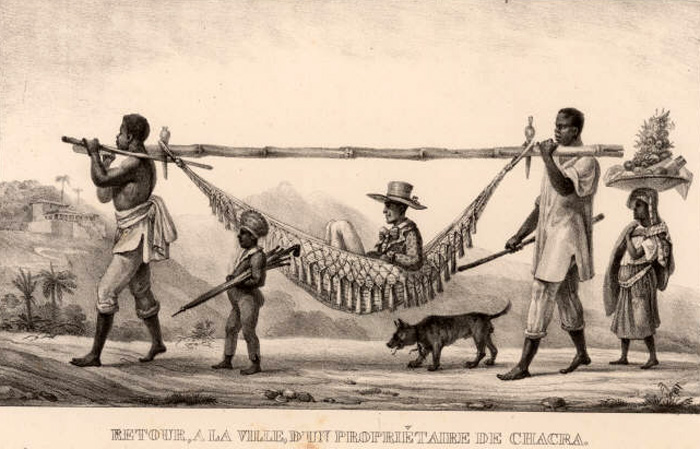
Illustration Debret Jean-Baptiste (1768-1848), derived from the book: Travel picturesque and historic in Brazil, or a French artist living in Brazil since 1816 until 1831 inclusive, times of arrival and the abdication of Pedro I. SMD, founder of the Brazilian Empire , published in Paris between 1834 and 1839
Hereinafter, the reproduction a text published here Thursday, January 21, 2010, by Serge Quadruppani , accompanied by some images gleaned by Ogre.
"I wrote and published this article (including No Pasaran) ten years ago, after spending six weeks in Haiti. If Aristide is gone, it seems to me that huge current disaster that unfortunately did show that the text is still relevant. "
"I wrote and published this article (including No Pasaran) ten years ago, after spending six weeks in Haiti. If Aristide is gone, it seems to me that huge current disaster that unfortunately did show that the text is still relevant. "

Revolt of blacks in Santo Domingo , August 22, 1791
1. Pigs and laws
ACMEL J, November 1999: in the warm Caribbean, the gray sand beach where the sea beats against the decomposed carcass of Albano grounded ship is going to know when, before the Yaquimo, pub bar Italian ristorante "(where the it only serves local cuisine), we see them, grazed detritus whose line runs parallel to the sea, the black pigs of Haiti. They are there, peaceful and voracious, and their presence is good news.
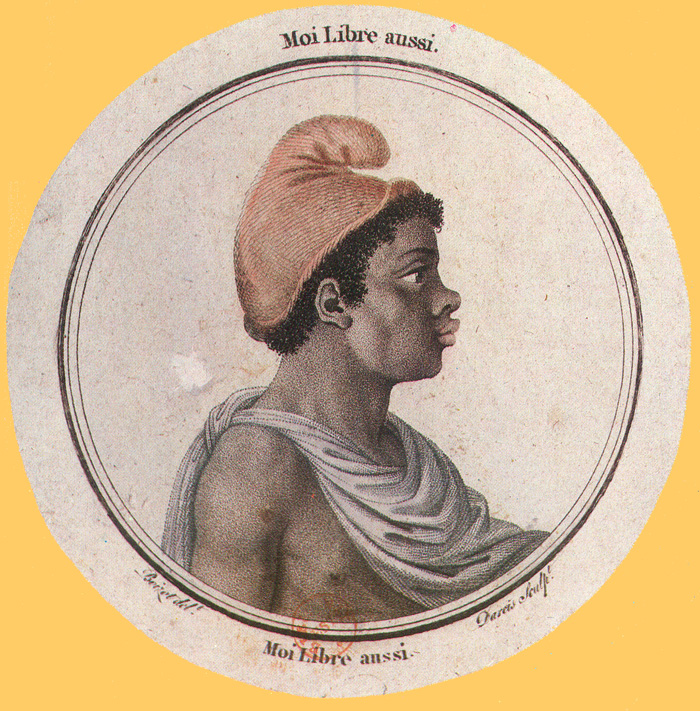
"Free Me too," engraving by Darcis Boizot
In 1981, under Baby Doc's dictatorship, was conducted a campaign for the eradication of African Swine Fever called (PPP), fully funded by the U.S. government. It was to last until the pigs slaughtered Creole (black), well adapted to local conditions, for replacement by pigs in North America (pink), much more fragile. Brigades "to look vaguely paramilitary" supported by the Tontons Macoutes-traquèrent systematically pig black depths of the countryside. In reality, the black pig was "healthy carrier" of the PPA: it was in excellent health, and meat could be consumed safely. But the PPP represented a mortal threat to North American farmers with pink pigs, much less resistant, might die in mass outbreak in their barns ultra-modern. As written A.-M. Ans, "the slaughter of Haitian pigs was therefore a task of compulsory solidarity imposed by U.S. farmers in Haiti, with the connivance of authorities in Haiti at the time ;.

"Free Me too," engraving by Darcis Boizot
One senses that this story of black animal healthy carrier of a disease as mortal could awaken fantasy in North American pink skin, when one remembers that at about the same time, Haiti was designated as the birthplace of AIDS. The side of the Haitian peasant, forced to realize its "capital-legged" without waiting for the opportune moment (or voodoo ceremony for the spirits to the Christian God, back to school ...), the operation had simply seen as the last, and really not worst, absurd and countless atrocities inflicted by the central government. Contrary to the belief of Ans, the Creole pig survived: we see much in the countryside and into the gullies of Port-au-Prince, we see a lot of mixed-bloods whose dresses can display all gradations and stains pink and black. I see the sign of the pigs and the stubborn resistance of the inventive rural people to his masters, black roses (whites) or spotted (mulattoes). For three centuries, the Haitian has learned to consider the state authority and those who monopolize as an unnecessary evil and yet inevitable. Southern Italy in Indochina via the former Soviet Union and Black Africa, we can consider that these are billions of people, perhaps the majority of the world's population, who are thus, for centuries, organized more or less to live despite the state - and continue.

Le Masurier ; a mulatto family , 1775
The Haitian street and the fields do not finish paying for the heroism of its ancestors, for the magnificent gesture of their masters and slaves chasing creating the first black republic history. No sooner this is done, their leaders, Toussaint L'Ouverture and Dessalines, had a hurry: to restore the plantation system and a disguised form of slavery for their own benefit. No wonder that, before such a program, ex-slaves had fled to the hills (mountains), to develop subsistence farming. Up Duvallier said Papa Doc, the political history of Haiti has essentially been a confrontation between two castes, especially the Black soldiers present in the North (Cap Haitien) and that of the mulatto bourgeoisie dominant Port-au-Prince. Meanwhile, have weighed heavily on the island on payment of the ransom of independence. It was not until 1825 that Haiti gained its international recognition, when Charles X "consented" to give him (without naming it) against payment of an indemnity of 150 million francs to the French settlers: the need to discharge this debt resulted, among other consequences, the militarization of the countryside, and from the peasants who sought to escape him, a new leak in the hills. Immediate repayment by France of that sum, plus interest, appears as the minimum payable by a State that spends his time lecturing on human rights and development.
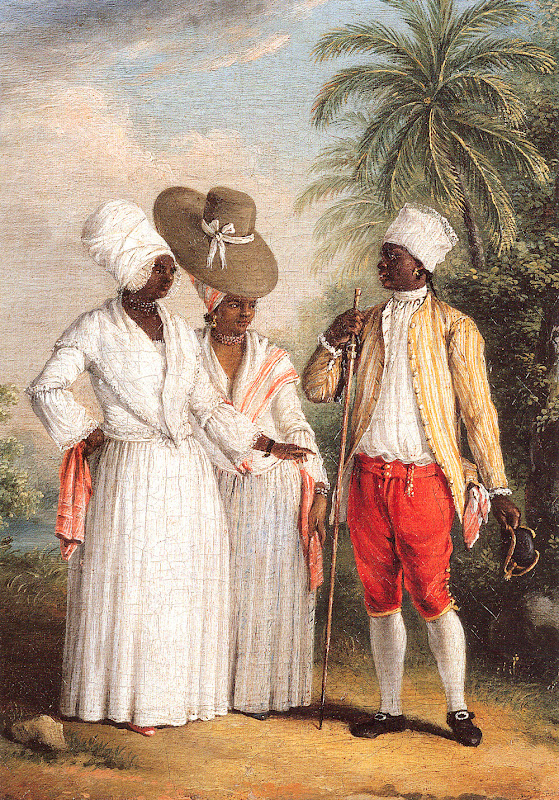
Brunias Agostino (1730-1796); free colored people of Dominica in 1770
Le Blanc who would walk in head the streets of Port-au-Prince must be prepared to experience an experience that has little to do with the joys of baguenaudage. Hesitating between a roadway where there is a jungle automobilistique before the Code, and sidewalks that are competing for a host of impressive density and baskets of merchant and commercial street, sweating in a downtown area that deserves its nickname of "Cauldron," struggling on steep slopes where the suburbs are spread on Petionville interminable distances up to the bourgeois careful where he puts his foot (the mouth of open drains is not unusual), suffocated by the black clouds of exhaust from a poor fuel quality, clouds that people here have learned to stand without flinching, subject to these vagaries fairly commonplace in the South, he will find Suddenly, with mixed feelings, it is in the midst of these thousands of black faces, the only white person walking. In Port-au-Prince, the whites are not going to walk: it speaks, as a picturesque except a priest who would persist every day down the slopes. Here white roll, usually in all-terrain vehicles hit the initials of an NGO or a UN agency.

Anne-Louis Girodet-Trioson of Roucy , portrait of Jean-Baptiste Belley, MP for Saint-Domingue , 1797
Through the presence of hundreds of institutions and organizations, and thousands of "international" Haiti shares with Cambodia, Kosovo and some other places the privilege of being under occupation UN-NGO . To determine the objectives and consequences of the imposition of de facto limited sovereignty would require, away from radicalism as hollow as the angelic droidlomiste, get to get into the skin of the proletariat by: metaphor even said quite the difficult thing, especially when we know that many Haitians rank spontaneously their countrymen on a scale of pigmentation including a dozen to twenty shades from very dark to almost white, usually avoiding each class to mix with those "from below".

Le Masurier ; black slaves in Martinique , 1775
In whatever color it is, the Haitian who was not related to a criminal power, could only welcome the role played by the moments MICIVI (Mission Preparedness in Haiti), when the UN and the OAU had imposed its installation in a country still under the jackboot of the military that overthrew Aristide. For example, at the funeral of victims of dictatorship, some participants who shouted slogans in favor of the priest who embodied the hopes of the oppressed while the slums, the church was surrounded by police and the chief had then come MICIVI All UN cars available to evacuate, hidden, people and threatened the cops could not stop them. Fleeting moment and the UN bureaucracy, where REM played the role of a power-cons. But when Aristide returned, with the support Americans, and the UN in his luggage, very quickly the second U.S. occupation had to evoke in the popular memory, bad memories of the first (1915-1934).

Jacques Grasset de Saint-Sauveur ; Costumes Peoples:
mulatto woman from Martinique with her slave , 1804.
Now, the UN agencies represented only the crutches of a state comes to the appetites of embryonic ruling cliques that vie for power. Through the UN and NGOs, the global capitalist democracy strives to impose its standards in a society dominated so far by a purely family and clan power. With Papa Doc, we had had, through the network of Tontons Macoute, A.-M. Ans what's called a "democratization of corruption": the ability to "make services "and" piston "to take its toll on all traffic of public money, and unsold daily services that the state, in modern countries, makes it free (in exchange for the tax), this possibility was not only to members of the oligarchy (black and mulatto), but also posted a lower level . So that most families were not unhappy to have an uncle macoute in their ranks, even if these thugs were constant terror reign of torture and murder, and although Baby Doc party was settled accounts with a portion of them (but another part, of course, has managed to convert).
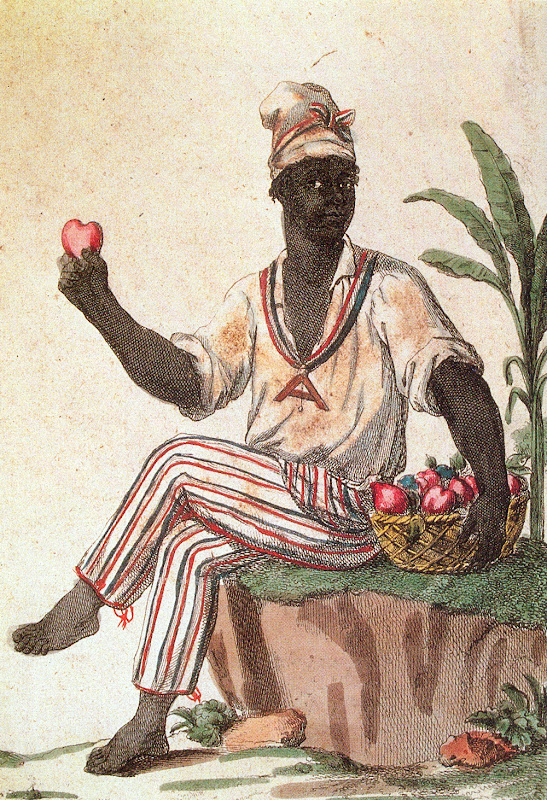
"Free Me" , engraving, West Indies, 1794
The UN and NGOs are now struggling to teach the standards of a social order in which class domination reach a sufficiently abstract so that everyone has the impression of being "equal in law". The result of this action is that it can happen that sanctions be taken against those who do not meet the standards in the lower ranks (police violence, for example, may be pursued). However, corruption, bribes and ownership deprivation of the state have not disappeared, they just flowed toward the top, to those who share the little that remains of state (mostly its representation to the world), members of the haute bourgeoisie, senior cleric and representatives of the middle classes they have co-opted. Simple example among others, the only web server installed in Haiti was forced to close because friends of Aristide were planning to open one soon. The ambiguity of international action seems ridiculous when public servants salaries of senior executives in North America (between 30 and 50 000 francs sometimes much more) are urging judges paid a hundred times less to give up corruption.
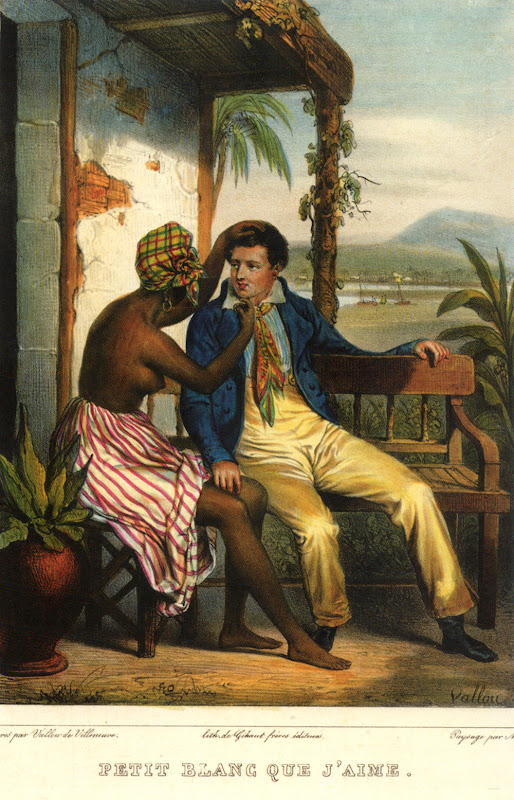
Julien Vallouis Villeneuve (1795-1866), Little White I like
This ambiguity becomes downright unbearable as the day when I accompanied a member of an NGO allowed into a police station to come and learn about the situation of an accused. The prisoner was one of the leaders of an organization to begin to answer a crying need for housing was occupied a vast field for the purpose of constructing a set of popular housing. The action had the support of first-Aristide mayor of the town. But then he had lost his job and the landowner, the family Meuse, one of the richest of Haiti, had managed to spare the support of Aristide and has therefore found a judge to imprison officer of the organization under a false pretext. Thus I found myself faced with custody cells where prisoners can stay up to six months and they are so crowded they are held and can never squatted lie down, and while all these black faces turned towards me through the bars, I realized that I had left to accompany my boyfriend without asking me any papers just because I'm white. For the same reason, whatever the sins I commit, I could take for granted never find myself in extreme discomfort when they were. Two hundred years after the revolt of Toussaint Louverture, I found myself in the shoes of the white face of free blacks imprisoned in inhumane conditions (and I can not say that I felt more comfortable in remembering how the people Haitian crowd knows in mass transportation beyond what I could bear). The cars marked with the initials A, which had seemed to bring with them a breath of fresh air, embody in the eyes of most people in the street as the arrogance of a bubble of wealth that they are tightly closed.

Izabella Godlewska de Aranda ; Lucia, Haiti , 1969
2. A country invented by trade (and who is bursting)
limits of the concept of "globalization" are nowhere more visible than in Haiti. Nowhere is the idea of returning to a golden age does not reveal all its ineptitude. Indeed, as we know, the country was discovered by Columbus in search of a shorter route to suck the wealth of India in the trade sector of Europe. And the Spaniards have begun to really look at this island until they saw that they were able to develop the culture of a plant may fall within this circuit: the sugar cane. The price of the genocide of the Tainos, the people who then occupied the island (operated by arms but also by disease and destruction of social ties) has begun the first period of the sugar industry, then stopped for a century when plantations of Brazil were more efficient. During this interlude, the island was abandoned to buccaneers who, far from joyous libertarian imagines the radical iconography, were small entrepreneurs dynamic and ferocious. To hunt the herds of cattle which had flourished in the island after the departure of the Spaniards who had brought them there, the Buccaneers were being manufactured specifically for ultra-modern weapons in Europe and recruited kinds of serfs among the peasantry impoverished by economic developments in western France. Thus equipped, they provided fresh meat that the buccaneers themselves, not "worked" than on geopolitical balance of power in the region, even there we are very far from Treasure Island and Robinson!
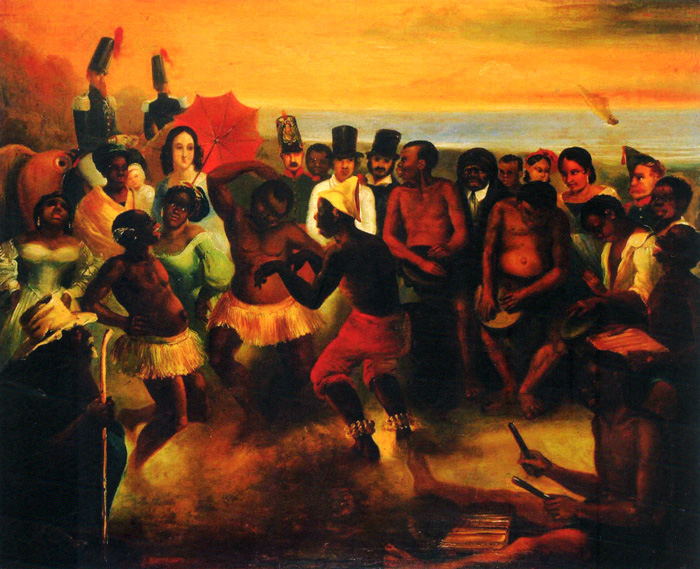
Emile Grimaud, men and women, white and black, form a circle around a man who dances . 1840-1848 to
The second period saw the sugar bring to a climax the logic of this type of monoculture completely turned to the production of a commodity for the world market: operating logic to death men - slaves transported Africa and kept in horrible conditions concentration camp - and soil (from an area was exhausted, we moved to the next). Then, as we have already said, Toussaint Louverture and his successors had ceased to reinstall the system, and it should only resistance of former slaves constituted peasantry that all of Haiti is not a desert today. But we're now further. As the ruling class was satisfied with the income of underdevelopment (as maintained by the debt service to France, resulted only in the fifties of the twentieth century) and never knew or wanted to develop local industry The country remained heavily agricultural, with subsistence crops in the hills.
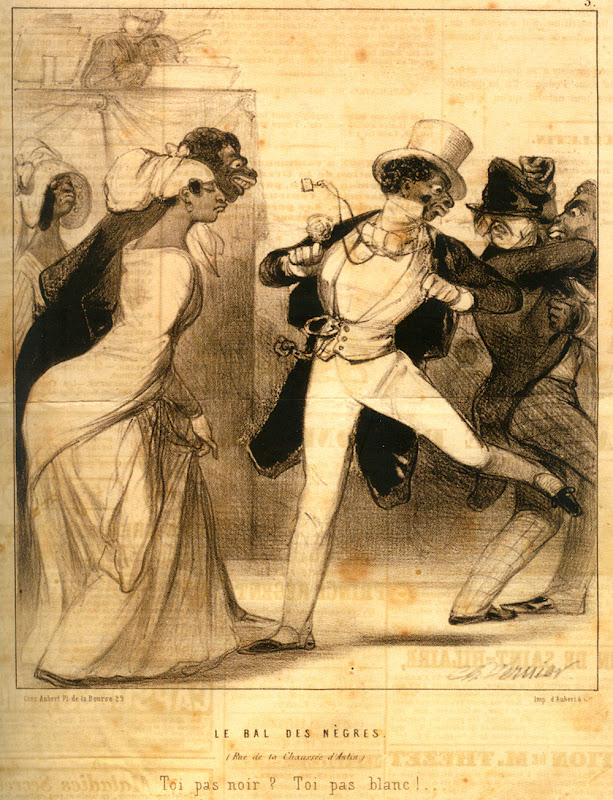
The Young blacks ...
But these cultures have long ceased to feed satisfactorily rural populations. Because of population pressure first - well maintained by the priests (recall that the second character of the Haitian Catholic Church was at the beginning of the reign Duvallier Cardinal Ducaud-Bourget, who later became the leader of the fundamentalist Saint Nicolas du Chardonnet). Due also to the blockade imposed by the good people against the regime Duvallier humanitarian and, as elsewhere, has practiced exclusively at the expense of the poor: in fact, their only source of energy consisting by the charcoal, they have compounded the deforestation, soil erosion and documentation of disappearance of farmland. The deterioration of living conditions in the countryside is visible in the fact that in several regions, we went from the stage of the plow than the hoe .... Today, much of Haiti, from the air, looks like a scorched earth.

Ursula, in: Duke Augustus : Island from 1827 to 1839 Galega . History by ordering St. Elmo Duke , Paris, 1848
can even, in wooded corners, see a man blowing a horn, calling on people around a common chore. A whole literature ethnological and apologetic bloomed around "combite" traditional association of farmers. These forms of solidarity are disintegrating under the demographic pressure, but not only. In the Artibonite region that produces rice "rice country" which, officially, we are very proud, NGOs believer to do good, wanted to better integrate farmers into the commercial circuit and offered them the money perform chores decongesting channels that previously were carried out jointly. Result: cleaning the most profitable channels and the explosion of solidarity. When you know the average is now half a hectare per family of five children, rural schools refuse to take new students (they are in percent level) and especially that the American rice invaded the present market and sold much cheaper than rice country, we understand what needs to be done to the peasant: winning the city.
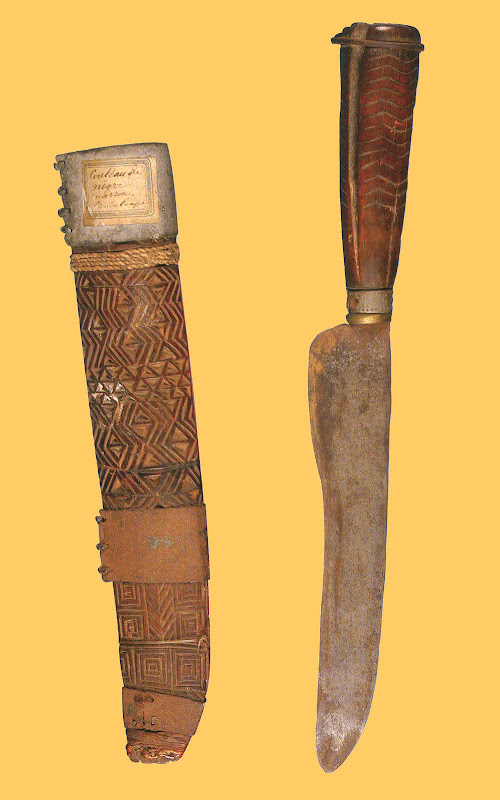
Negro brown knife ...
Thus, excluding land and rice fields burned, some forest areas remain, and eke out some small towns, cut off from the world not by distance but by the condition of the tracks (they are more roads , since, covering cement, more durable, it was generally preferred asphalt, more profitable for international companies), Haiti, especially two cities which swell as a result of rural exodus, Port- au-Prince and Cap Haitien. The latter city has grown in ten years, from 80,000 to five hundred thousand inhabitants. Inner cities reach levels of decomposition can be difficult to imagine. Slums grow at the periphery but also in Port-au-Prince in the gully: while the ridges are occupied by the villas of the rich, the huts of the poor are crammed hard on the slopes and collapse with first floods. No wonder there, as elsewhere, more than elsewhere, is expanding the industry of fear. Omnipresence of bars, barbed wire, equipped with private guards shotguns: Petionville, there are up to pastries.
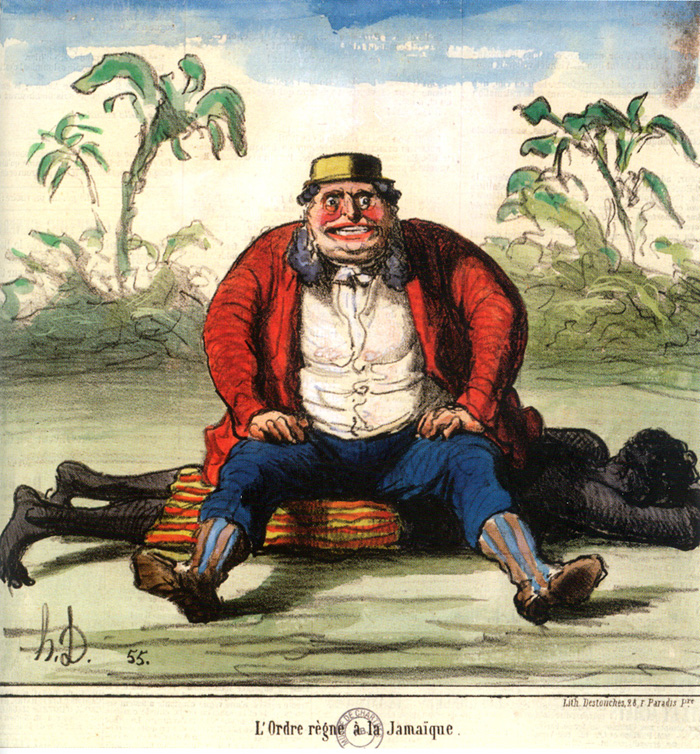
Honoré Daumier (1808-1879); Order reigns in Jamaica
The streets are crowded with signs written, almost all in French, that the vast majority of people, Now, do not know really read, they only speak Creole - and often illiterate. The majority are shop signs that proclaim faith in God and the nature of the goods offered, "Jesus Christ King of Kings Cola Soda Clairin Rice." The other, equally ubiquitous, present only two ways to enrich themselves available to the vast majority of the population: the lottery shops (some work on the Italian football championship, on the other prints in New York or San Domingo) and schools.

Playing Card (Time of the French Revolution) ...
When I arrived, public schools were on strike. A month later, the strike had frayed a lot but was still not completed. The previous government promised an increase of 30 percent for teachers, now refused to hold the promise for all of this course on a pittance, enough to feed the family (and meanwhile, in the offices of the Ministry , the French volunteers to 50,000 francs per month to devise teaching strategies learned). So thriving private schools, where teachers tributary of the public, disgusted: the parents of the four veins bleed to send their children (you must pay for everything, including the uniform: no school without uniforms). This in the hope that the child will learn enough to earn an income that will support the family. But except in a handful of very expensive institutions, teaching is generally of low quality. Everything depends on the "by heart": the night in the towns, in the absence of electricity in most homes in most cases, we see dozens of students who seek sources lighting (stores, institutions, French alliance ...) to read for hours of French texts they often learn without understanding - since, in life, they speak Creole.
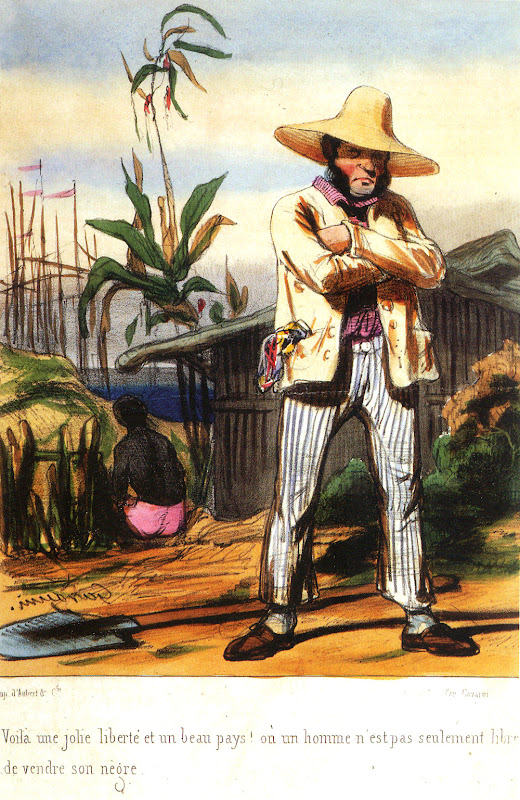
Gavarni Paul (1804-1866), illustration:
"That's a nice freedom and a beautiful country! Where a man is not only free to sell his negro. ";
Caricature, 1843
Caricature, 1843
What is the outcome of the massive presence of international organizations? It is somewhat mixed, although it is likely that institutional barbarity, at least, has declined: we do not torture almost is beats more rarely, sometimes arbitrary detentions continue. Much money is distributed, which surely is also sometimes help the poorest - to help them get by, obviously not jeopardize their misery. But also the UN-NGO created here, as this set is installed wherever an artificial economy that has done much for the high cost of living, especially soaring rents of dwelling houses (the other, the dangerous shacks are built without right or title). So there are two companies who cohabit. On the one hand, the vast majority of the population, living in a precarious general, with almost no electricity, no medical care (in hospitals, if we can not afford the medicine that NGOs have given, we die), transport exhausting, no running water ( has been part of the parade Vesper, even in the cities of women and girls, sometimes boys, not men, who carry the buckets of water on the head: it was a lot of nice pictures with). On the other, the bourgeoisie and international behind their barbed wire, with their equipment and their products worldwide. Between the two, operating very weak transfer of wealth, zengledos, the bandits who use weapons of the army disbanded by Aristide sometimes kill a few rich and often kill the rich.

Illustration Charles Emile Jacques (1813-1894) in "La Caricature", 1843
addition to the presence of the bulky " ; help "Internationally, the Haitian poor must also support the drug traffickers. First, the very small but nonetheless deleterious traffickers of cocaine: five percent of what is consumed by the U.S. nostrils passes through Haiti. Coke merchants also contribute to soaring property prices, because they are wary of investing in banks and stones and earth. They also buy service stations in a country so devastated, it is quite strange to see the incredible wealth pumps, and also in supermarkets that flank them, pieces of dreams where the U.S. found that almost all goods person in the country can afford. But the worst traffickers, quantitatively and qualitatively, it is of course dealers opium of the people: religion is a major plague Haiti. I found there, as in Asia, particularly visible and pervasive, these Protestant sects of U.S. origin, with their money and desperate to eradicate communal traditions in order to impose capitalist competition as God's will. But Haiti is the great show of religion: between the reverend who, in the North, tampers with international food markets and sells food that should have been distributed to schoolchildren and the bishop who, South Command an army of peasants that sends his opponents cons promising them a pig each, except perhaps a few survivors of the theology of liberation, clergymen behave here as the worst of men power. The first of these, Aristide, a defrocked priest only, biding his time, leaving his men to act, by sabotage and intimidation, so that the elections be postponed until the presidential elections, where he hopes to finally access to supreme power. So the former liberator from yesterday may finally be openly what is already potentially means a Duvallier more presentable. But also the personality of the religious, which I think is the most serious is basically the spirit of resignation here, as elsewhere, much more here than elsewhere, religion instills.
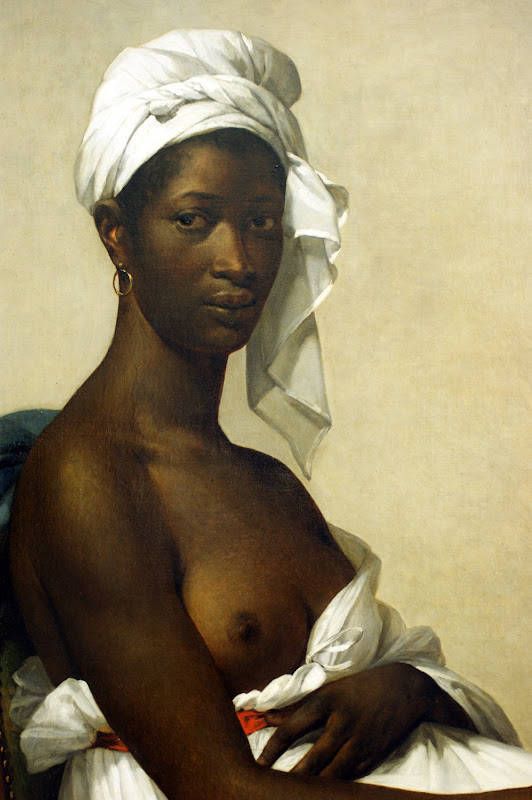
Marie Guillemine Benoist (1768-1826); Portrait of a black woman
On many taps-taps (taxis) from Port-au Prince, you may read this message Obsessive: "Thank you Jesus." In view of the state the country, you can expect the toad of Nazareth giggling in her crib: "Not enough, guys, really nothing!"
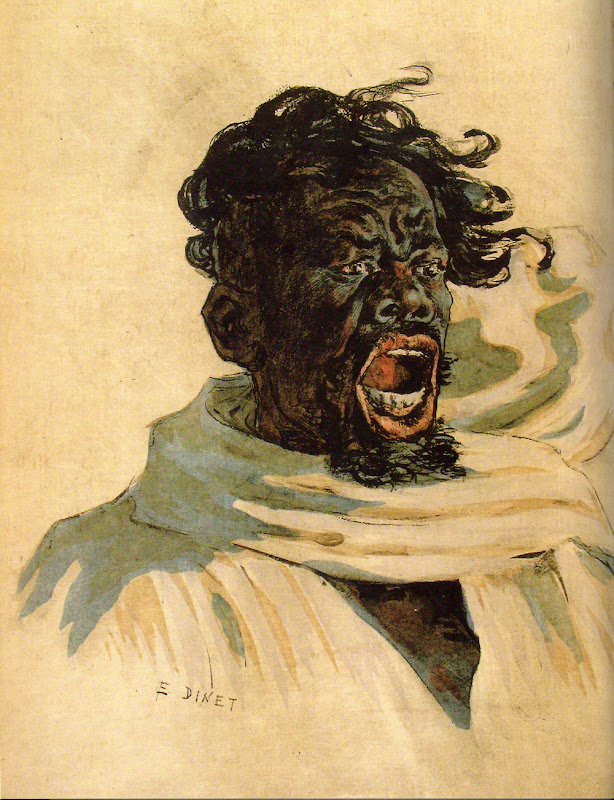
lithograph 'Etienne Dinet (1861-1929) for "Antar", an epic poem pre-Islamic times, Paris, 1897
0 comments:
Post a Comment